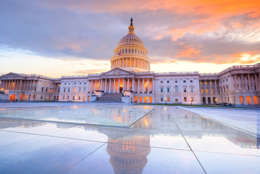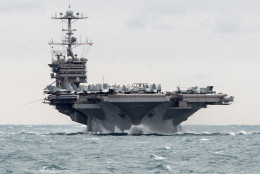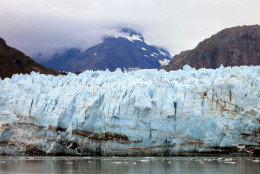climate change
-
Heading toward April, the Trump administration was operating on several fronts, following the withdrawal of Republican-led legislation revising health care law.
March 30, 2017 -
Freedom of information advocates say the recent uptick in FOIA requests is due to a combination of current events and interest in the presidential transition. But the growing interest does mean an additional burden on already short-staffed FOIA offices.
January 30, 2017 -
All in all, the Trump-to-Energy questionnaire presents a daunting and intimidating rasher of information to gather.
December 29, 2016 -
The Navy launched its year-long green initiative that will use alternative fuels and procurement practices to make the service more fuel efficient.
January 20, 2016 -
The Defense Department's new policy on climate change forces component heads to consider climate change in almost every decision.
January 19, 2016 -
The government’s latest budget playbook, the Circular A-11, for the first time includes a specific mention of climate-smart buildings.
July 06, 2015 -
The 2015 budget came with more than money for federal agencies. You got some homework, too. Namely 15 Cross-Agency Priority (CAP) goals important to the White House. They cover everything from cybersecurity to climate change. Brenna Isman is a project director at the National Academy of Public Administration. She joined Tom Temin on the Federal Drive to discuss some of the CAP goals agencies will be working toward over the next year or so.
January 12, 2015 -
Leaders at the Army Corps of Engineers say the effects of climate change mean its vast network of civil works projects is going to have to contend with weather events that are more severe — and most importantly — less predictable. As Federal News Radio DoD Reporter Jared Serbu reports, the Corps is changing its planning process to account for that uncertainty, and it's about much more than building higher and stronger dams and levees.
November 13, 2014 -
The Army Corps of Engineers' strategy for building more resilient civil works infrastructure involves planning for more unpredictable weather events, and treating watersheds as integrated systems instead of a collection of standalone projects.
November 13, 2014 -
A group of retired military officers is urging the Pentagon to beef up plans for dealing with the impact of climate change. The advice comes in the form of a 68-page report published yesterday by the CNA Corporation. It says the risk has accelerated and that climate change is a catalyst for conflict. Rear Adm. Dave Titley (Ret.) is a member of the CNA Corporation Military Advisory Board and a former Navy Oceanographer and Navigator. He told Tom Temin and Emily Kopp on the Federal Drive what CNA is recommending to current military leaders.
May 15, 2014 -
Wildfires, floods and invasive pests are just some of the natural risks that farmers and other rural landowners are facing at an increased rate. Now, the Agriculture Department has a plan to help combat those risks. Last month, it launched the first Regional Hubs for Risk Adaptation and Mitigation to Climate Change. The seven hubs will provide information to farmers. Bill Hohenstein, director of USDA's Climate Change Program Office, spoke with Federal Drive hosts Tom Temin and Emily Kopp about the goals of the program.
March 25, 2014 -
Rear Adm. David Titley, director of task force climate change, examines how changing climate impacts naval operations.
November 15, 2011 -
The National Research Council says that a rise in sea levels of about three feet could jeopardize $100 billion worth of Navy installations.
March 24, 2011 -
Climate change is having implications for the Navy, according to a new assessment by the National Research Council of the National Academy of Sciences.
March 11, 2011 -
Dr. Susan Solomon is with NOAA and works on global warming issues.
July 27, 2010










